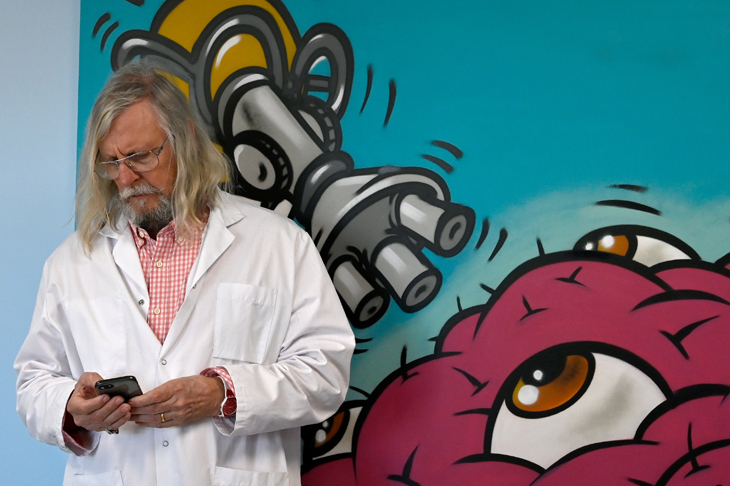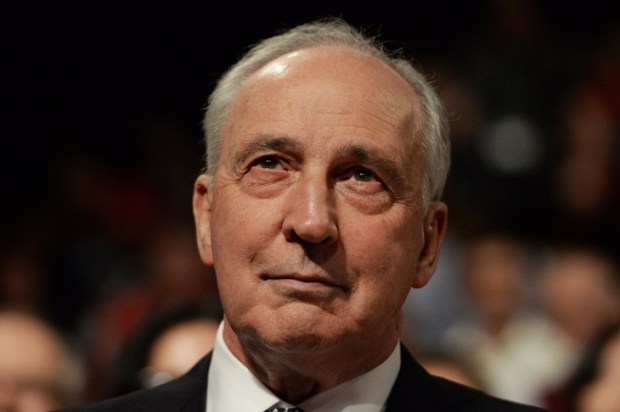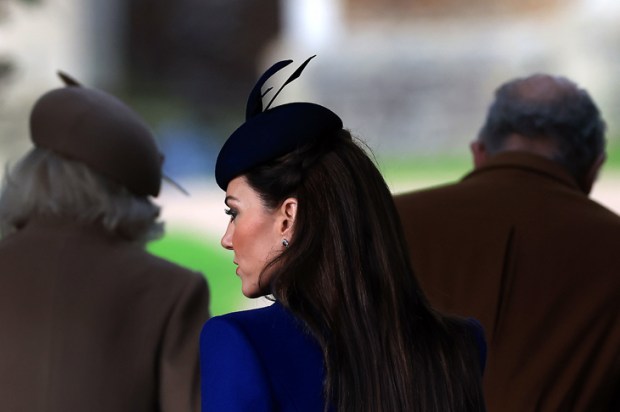Le Gilet Jaune des Blousons Blanches (the Yellow Vest of the Lab Coats), sneered a TV talking head at Professor Didier Raoult, the world expert on infectious diseases who says he has a cure for Covid-19.
On March 29, Raoult tweeted that since March 3, his hospital had treated over a thousand Covid-19 patients with a generic anti-malaria drug and an antibiotic and only one person had died. Over that period, 2,602 people died of the virus in France out of more than 44,000 cases. That suggests if Raoult’s treatment had been adopted, as few as 44 people might have died.
With that sort of success you’d thinkRaoult would be a national hero and the scientist who looks like the druid Getafix from the beloved Asterix comics, is being hailed as a latter-day de Gaulle, saving the French in their darkest hour since World War II. Yet while the people of Marseille form a long, socially distanced queue outside the Institut Hospitalo Méditerranée Infection, waiting to be tested and treated, in Paris, Roualt is despised by the medical establishment.
His detractors claim that he is only treating mild cases that would have gone away on their own. But a study published this week shows that of 80 patients studied, 60 per cent had at least one risk factor for severe Covid-19, such as hypertension (13), diabetes (9), chronic respiratory disease (8), cancer (5), coronary artery disease (6), immunosuppressive treatment (4), around 53 per cent had pneumonia and almost 30 per cent were over 60-years old. Yet only one 86-year-old passed away. Even better, more than 80 per cent were discharged within ten days as they were no longer contagious, with a mean length of stay of 4.6 days. Compare that to a study of 191 Chinese patients who were hospitalised — 28 per cent died, and the survivors had fever, on average, for 12 days, cough for 19 days, and were contagious for several weeks.
Raoult says the secret of his success is to test everyone and for those who need it, treat early, before the virus does irreparable damage to the lungs – a French version of the South Korean model, which also worked in Taiwan and Singapore. He is strongly opposed to a ‘lockdown’ of healthy people which he calls a ‘medieval’ solution. Yet on 16 March, Macron ordered a partial lockdown.
With more than 400 people in France dying in just one day last week, there is a feverish atmosphere. People are outraged that a cure proposed by the country’s most eminent expert is being deliberately sidelined by the government.
As the epidemic kicked off, on 13 January, the French Health Minister classified chloroquine as a ‘poisonous substance’ so that, after 50 years, it would only be available on prescription. On 20 March, Dr Christian Perronne, a highly- respected Professor of Infectious diseases said that chloroquine was a very promising drug and revealed that ‘the central pharmacy for French hospitals had been “pillaged” of its stocks. Then, on 24 March, the Health ministry officially prohibited the use of chloroquine except for the terminally ill. Raoult responded saying that if the Minister’s directive was followed ‘then they will be able to say that chloroquine doesn’t work’.
Those who attack Raoult include the former Minister for Health who resigned just as deaths were starting to accelerate on 11 March to throw her hat in the ring to be Mayor of Paris, her husband, who was the head of the French National Institute of Health and Medical Research, and their friends; researchers who have powerful roles on committees and also receive funding from major pharmaceutical companies who just happen to be promoting more expensive drugs, still under patent, as a cure for Covid-19.
They say there is no evidence of the efficacy of hydroxychloroquine, dismissing five trials in China that show that it inhibits the replication of both the original Sars virus and the new Sars-CoV-2. They also discount three clinical trials in China that were so successful that chloroquine was adopted as a first line treatment for mild, moderate and severe cases of Covid-19. Yet their principle complaint is that Raoult has not conducted a double-blind trial in which neither patient nor doctor knows who has been given the new medication and who has been given a placebo. Raoult says that as a doctor, he has an obligation to honour the Hippocratic Oath and make a life-saving treatment available to all patients who want to try it, comparing his results with those of hospitals using conventional treatments.
Raoult’s supporters accuse the government of creating an artificial scarcity of a cheap drug so that big Pharma can peddle an expensive and ineffective drug. It’s a byzantine feud that makes the furore on the other side of the Atlantic look like child’s play.
When President Trump saw a tweet from Elon Musk saying the French had found a cure for the coronavirus, he knew it could be a game-changer. Not only would nobody die, but we could stop killing the economy.
The ugly truth is that for the Trump-haters it’s a case of better dead than red; they want corona to kill off the President’s chance of getting re-elected, so chloroquine becomes a case of red pill, blue pill, as in the movie, The Matrix, the red pill is freedom and harsh reality, the blue pill is an endless lockdown.
The trouble for New Yorkers is that with over 67,000 cases and 1,300 deaths, whether to take Trump’s ‘miracle cure’ is personal. Professor Ian Lipkin, the director of the Centre for Infection and Immunity at Columbia University, is no deplorable. But as the adviser to Steven Soderbergh on his 2011 movie Contagion — an all but forgotten flick until Covid-19 turned it into the most popular pandemic picture to watch in self-isolation — he’s a regular on Fox News.
Last week he revealed on air that he’d tested positive and was feeling miserable. And although, like all experts, he’s criticised the fact that there was no double blind trial, he said he was taking Trump’s wonder drug and hopes it will work. Columbia is one of two universities in the US that is running a double-blind trial but Lipkin seems to have opted for the certainty of getting the medication rather than run the risk of being given a sugar pill. Will it work? We won’t have to wait long to find out. But for a deep blue state like New York, either way, it’s a bitter pill —heads, Trump wins, tails, they could lose their life.
Got something to add? Join the discussion and comment below.
Get 10 issues for just $10
Subscribe to The Spectator Australia today for the next 10 magazine issues, plus full online access, for just $10.
You might disagree with half of it, but you’ll enjoy reading all of it. Try your first month for free, then just $2 a week for the remainder of your first year.














Comments
Don't miss out
Join the conversation with other Spectator Australia readers. Subscribe to leave a comment.
SUBSCRIBEAlready a subscriber? Log in